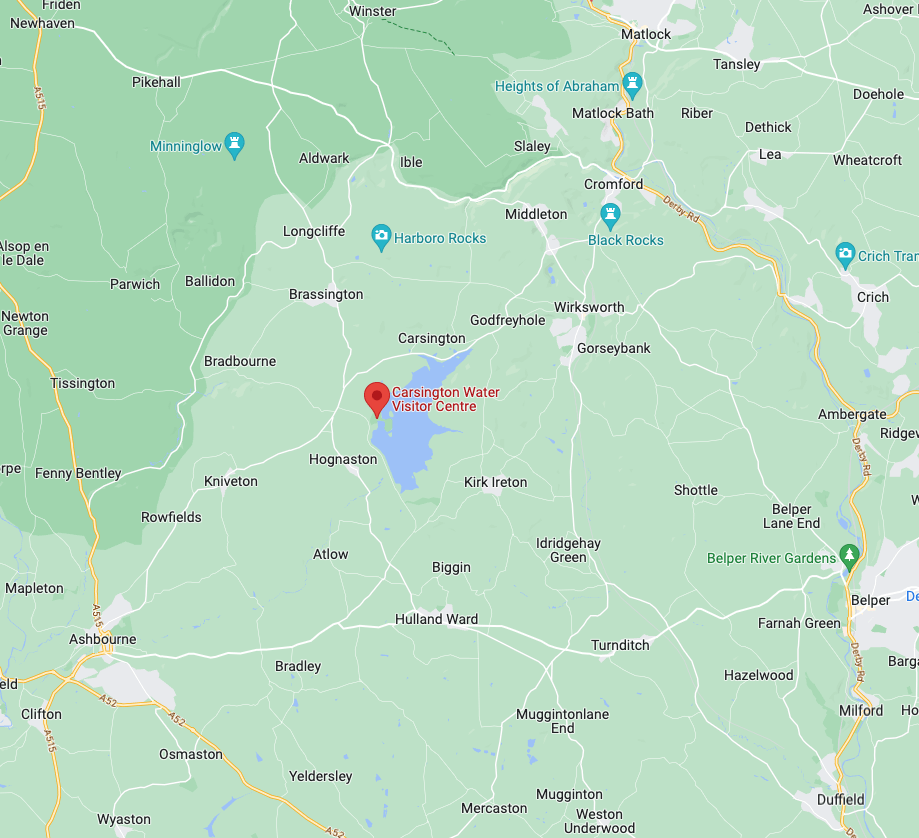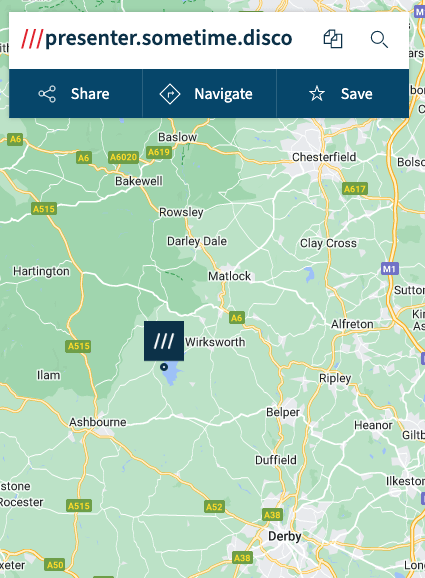Mobile Users click the icon top left to navigate the site ![]()
![]() Latest Sightings
Latest Sightings ![]() Submit Sightings
Submit Sightings

WHERE ARE WE ?


Facilities and information for birdwatchers at Carsington Water.
Carsington Water is a multi-user water facility operated by Severn Trent Water.
It was opened in 1992 by HM The Queen and is the 9th largest reservoir in England. It sits around 200 metres above sea level with an eight-and-a half mile walk around the 300-hectare surface area of water. It has become a major tourist attraction, particularly busy on sunny weekends and school holidays. There are three bird hides (one currently closed for renovation) plus a Wildlife Centre hide, all with disabled access, three large car parks, an impressive Visitor Centre, interactive display, restaurant, café, shops and toilets. Foot and cycle access is via any part of the circular route. There is limited access to the shore and no public access to adjacent fields or to the seven islands but most shorelines and islands can be viewed with little disturbance to wildlife.
Visitors do not need to tackle a full perimeter walk to enjoy the site and see a good proportion of the birds it has to offer, as the bird hides are concentrated on the north-western shoreline between the Visitor Centre and ‘Hopton End’ at the reservoir’s most northerly point.
Some of the densest woodland is on the eastern shoreline, Hall Wood, Middle Wood and plantations fringing Fishtail Creek offering the stealthier birdwatcher glimpses of birdlife away from the water’s edge.
CAR PARKING
Please go to the Severn Trent Water website (https://www.stwater.co.uk/our-visitor-sites/carsington-water/parking-at-carsington) for the latest information on parking, which is by automatic number plate recognition (ANPR) at all three car parks.
Please note that all three Carsington Water car parks now operate an automatic number place recognition (ANPR) system. Visitors can typically pay on exit using their registration number at the payment terminals, on line or via the Severn Trent Water website.
Visitor Centre Car Park: This is the largest car park, with overspill on busy days. It costs £7 to park all day, £6 for up to four hours, £3.50 for 1-2 hours and £2 for up to one hour. It is open 7:30am to 7pm (8pm in the summer months).
The Visitor Centre itself is open 10am-5pm. A large restaurant, café, shops, toilets, cycle hire, watersports, fishing and children’s playground are also located here or very close by.
The Wildlife Centre is off the north end of this car park. It is a heated hide containing displays, wildlife information and wildlife recording book. It overlooks an island for breeding birds and a feeding station affording close views of a range of smaller birds.
Located across a causeway behind the Visitor Centre, Stones Island provides good views over much of the water, and from here the gull roost can usually be observed at dusk. Outside busy visitor times it attracts common passage birds; best time to visit is early morning.
Millfields Car Park: costs £3 up to 2 hours, and £4.50 over 2 hours. It has toilet facilities and is open from 8am until 7pm (8pm during the summer months).
This is the best location to access the dam wall and walks below, also for checking Penn Carr, Millfields Island and a feeding station in car park. Some of the expanse of water and the dam wall can be viewed from cars, which is useful in poor weather.
Sheepwash Car Park: costs £2 for 2 hours and £4 for over two hours, but there are no facilities. Also open 8am until 7pm (8pm in the summer months).
Head north-east for access to the new Sheepwash Hide and to Paul Stanley Hide where Marsh Tits have joined Willow Tits (among others) on the feeders. These hides have various bits of useful information, such as CBC’s monthly Bird Notes, plus site diaries for checking on/recording sightings
Head south-west from the car park to Lane End Hide, this hide is currently unfortunately in a poor condition but still gives good views over the reservoir.
All hides contain Carsington Bird Club membership information and application forms.
NB: For regular visitors, an annual pass covering all Carsington Water car parks costs £59, and an annual Severn Trent Water multi-site pass is £69.
BIRDING INFORMATION:– 70 daily, 100 monthly, 170 annually and 237 species (to 2022) recorded since 1992.
Species numbers: Up to 70 recorded daily, 100 monthly, 170 annually and the site has accumulated a grand total of 240 species (to 2025).
Breeding Birds: 65 species breed annually and, overall, 80 species are proven to have bred, plus 16 possible, since 1992. Recent counts of singing birds in spring have included over 150 Chiffchaffs. Sadly, we appear to have lost Tree Sparrows and Willow Tit numbers are declining.
Wintering Wildfowl: Up to 2,000 Ducks, 1,000 Coot, 1,000 Canada Geese and over 1,000 Pochard (2024/25), with 30+ feral Barnacle Geese.
Waders: Spring and autumn passage varies depending on the water level, with up to 20 species in total, but only a few per day. Oystercatcher regularly breeds, with Lapwing and Redshank now only occasionally breeding.
Raptors: Buzzard, Sparrowhawk and Kestrel are resident. Red Kite is now a regular visitor, with Ospreys passing through in small numbers in both spring and autumn.
Autumn/winter gull roost: Up to 10,000 birds, with 13 species recorded. Best viewed from Sheepwash Hide or Stones Island at dusk.
PLEASE leave records of birds, mammals, butterflies and dragonflies in the hide diaries provided, with details and contact names, essential for any significant sightings.
